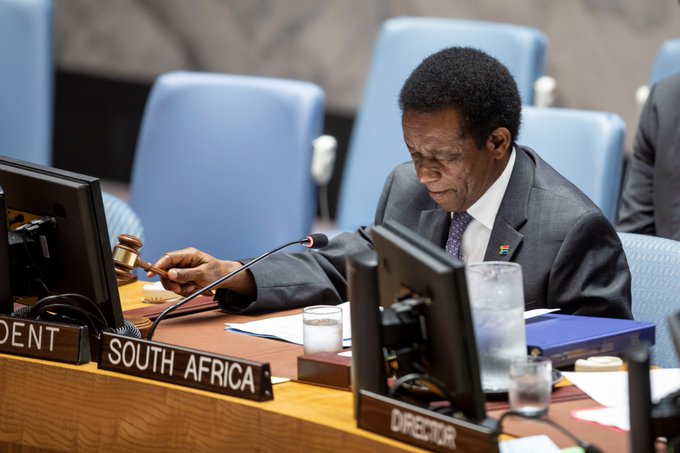Peace and Security
Recognizing the potential of African youth caught up in conflict to forge peace, is crucial for nurturing their developing identities, and could help them turn away from violence, a youth representative told the Security Council on Wednesday.
“We have to value youth and their contribution to society, they will look for recognition elsewhere, if we don’t,'' Aya Chebbi, youth envoy for the African Union (AU) who hails from Tunisia, explained during the Council’s meeting on peace and security, in line with a flagship AU project to “silence the guns by 2020.”
In order for youth to give up their guns “we have to give them direction” and provide “the enabling environment” for them to thrive, she explained.
The meeting, convening under the presidency this month of South Africa, follows a vision established by African leaders to end all wars in Africa by 2063, which involves stamping out gun violence by 2020.

South African Mission to UN@SAMissionNY
Amb. Jerry Matjila: "It is an honour for #SouthAfrica to preside over the #UNSC under the theme “Continuing the Legacy: Working for a Just and Peaceful World”. This is the embodiment of the legacy of #NelsonMandela".

The Council endorsed the commitment through resolution 2457 in February, outlining steps to achieve continent-wide peace through international support. In December 2015, the 15-member body also mandated a study on harnessing the energy and creativity of youth in resolving conflict, through adoption of resolution 2250.
Youth - persons aged between 15 and 24 – make up 1.2 billion of the world's population, 600 million of whom live in violent regions. Roughly 20 percent of the population of the African continent fall within this age range.
Given these figures, the active engagement of youth is vital in shaping peace and contributing to reconciliation, the Security Council has said.
“We must change the narrative about African youth,” Ms. Chebbi urged, adding that recent waves of youth-led peace movements are indicative of what the young generation desire and can achieve.
In South Sudan youth are replacing bullets with books, she explained, while Kenya is making progress in empowering women to use art as a cultural bulwark against violence, showcasing momentum amongst youth “with little resources” who “did not wait on resolutions to act”.
2020 deadline, ‘an absolute necessity’
Underscoring the core aspect of the meeting’s theme, Special adviser of the Secretary-General on Africa, Bience Philomena Gawanas, said “mobilizing the youth toward silencing the guns by 2020, is not a choice, but an absolute necessity.”
The number of conflicts on the African continent have compromised peace and security across borders, and too often, perspectives of youth associated with the violence and conflict, she added.
Correcting the stereotype, she insisted that “it must always be recognized that the large majority of youth in Africa are in reality peaceful, they are agents and partners of peace - the connective tissue - and have a critical contribution to make.”
Africa will remain at the core of the Council’s work every week this month, with a second thematic debate on peace and security set for 7 October.
By May of 2020, Secretary-General Antonio Guterres is expected to submit a report on the implementation of resolution 2250, along with 2419, adopted in June of 2018, with the aim of recognizing the role of youth in peace contributions.
“Young Africa deserves a seat at the table and in decision-making positions to make peace possible”, Ms. Chebbi urged.
“Young Africa cannot continue to be ignored, as the most youthful population in the world. My generation is ready to make an impact that may not be comprehended but cannot be denied”, she maintained.
